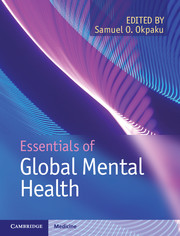Book contents
- Essentials of Global Mental Health
- Essentials of Global Mental Health
- Copyright page
- Dedication
- Contents
- Contributors
- Preface
- Acknowledgments
- Introduction
- Section 1 History and background of global mental health
- Section 2 Advocacy and reduction of stigma
- Section 3 Systems of development
- Section 4 Systems of development for special populations
- Section 5 Gender and equality
- Section 6 Human resources and capacity building
- Section 7 Depression, suicide, and violence
- Section 8 Research and monitoring the progress of countries
- Epilogue
- Index
Section 4 - Systems of development for special populations
Published online by Cambridge University Press: 05 March 2014
- Essentials of Global Mental Health
- Essentials of Global Mental Health
- Copyright page
- Dedication
- Contents
- Contributors
- Preface
- Acknowledgments
- Introduction
- Section 1 History and background of global mental health
- Section 2 Advocacy and reduction of stigma
- Section 3 Systems of development
- Section 4 Systems of development for special populations
- Section 5 Gender and equality
- Section 6 Human resources and capacity building
- Section 7 Depression, suicide, and violence
- Section 8 Research and monitoring the progress of countries
- Epilogue
- Index
Summary
Information
- Type
- Chapter
- Information
- Essentials of Global Mental Health , pp. 163 - 242Publisher: Cambridge University PressPrint publication year: 2014
